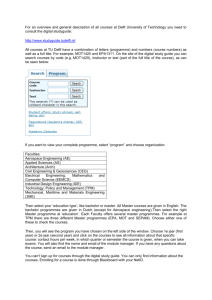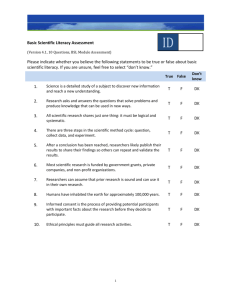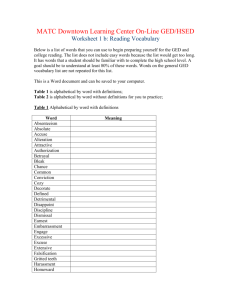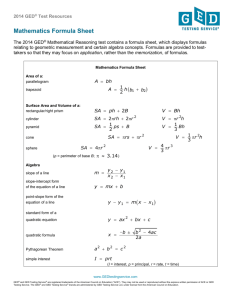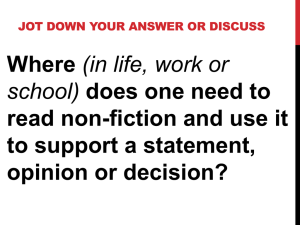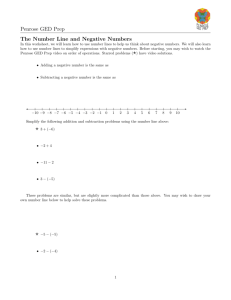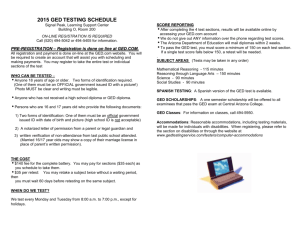File
advertisement
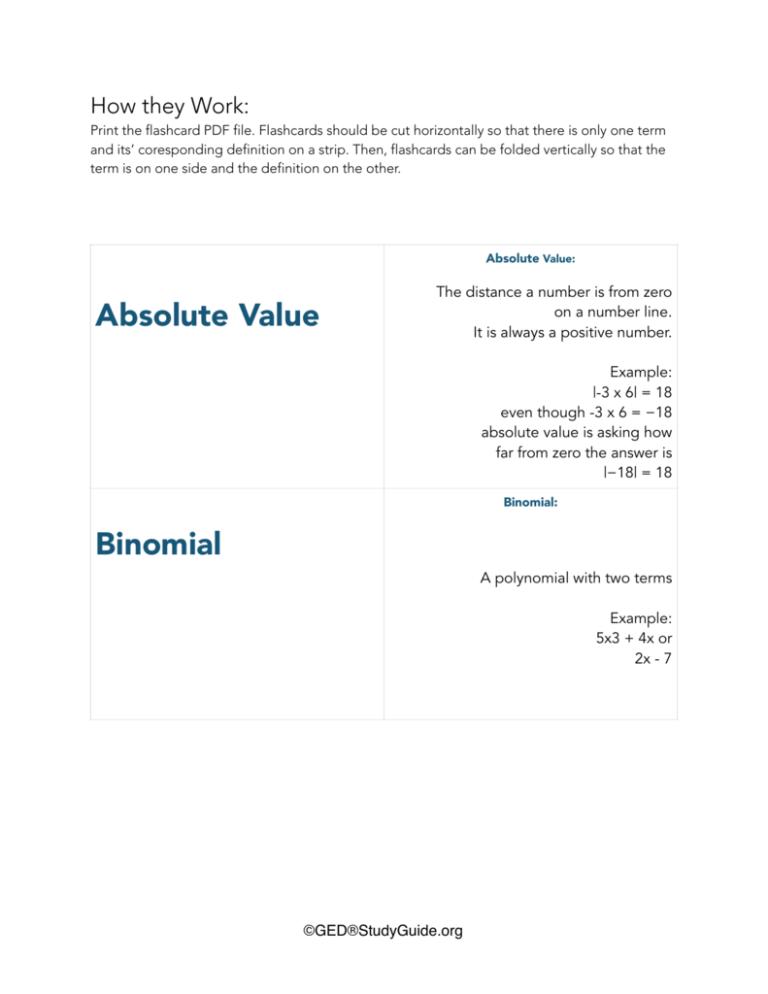
How they Work: Print the flashcard PDF file. Flashcards should be cut horizontally so that there is only one term and its’ coresponding definition on a strip. Then, flashcards can be folded vertically so that the term is on one side and the definition on the other. ! ! ! ! !! ! Absolute Value ! Absolute Value: The distance a number is from zero on a number line. It is always a positive number. ! Example: |-3 x 6| = 18 even though -3 x 6 = −18 absolute value is asking how far from zero the answer is |−18| = 18 !! Binomial ! !! !! !! ! ! ! ! Binomial: ! ! ! A polynomial with two terms ! Example: 5x3 + 4x or 2x - 7 ©GED®StudyGuide.org !! !! Constant !! ! ! Constant ! A term that is unchanging Either has no variables or variables that cancel out ! Example: 15 or 2x + 7 - 2x !! !! Coefficient !! !! Coefficient ! Number that is multiplied times a variable or powers of a variable ! ! !! !! Data !! !! ! ! ! ! Example: In the expression 5x - 4y² + z the coefficients are the numbers next to variables, in this case 5, -4 and, 1 Data Collected facts and Information used to analyze a situation ! Example: Types of apple brought for lunch Gala: 7 Honeycrisp: 3 Granny Smith: 1 Red Delicious: 5 ©GED®StudyGuide.org !! !! Decimals !! !! !! Decimals Numbers that show amounts which include a portion of a whole number. Converts to fraction or percentage Example: .75 decimal = ¾ = 75% 1.25 decimal = 1 ¼ = 125% !! ! Decimal Points !! !! !! ! Degree !! !! ! ! ! ! ! ! Decimal Point The symbol that shows the separation between a whole numbers and a portion or part of a whole number ! Example: 7.9 has decimal between 7 and 9 7 is the whole number and .9 is a 9/10 of a whole number ! Degree! The largest exponent in an expression If no exponent is shown it is 1 ! Example: x⁵ + 7x the degree is 5 6x + 7 the degree is 1 ©GED®StudyGuide.org !! !! Denominator !! !! ! The number on the bottom of the fraction Example: In the fraction, 5/6, the denominator would be 6 ! ! ! ! !! !! Difference !! !! ! !! !! Distribution !! !! ! ! ! ! Denominator Difference ! The answer to a subtraction problem. ! Example: 7-5=2 the difference is 2 ! Distribution Data showing the frequency of an occurrence ! Example: A graph can show distribution of data ©GED®StudyGuide.org !! !! ! Dividend !! !! !! !! Divisor !! !! ! !! !! Exponent ! ! ! ! Dividend The amount that is being divided ! Example: In the problem 5 ÷ 6 the dividend is 5 as that is the number being divided Divisor ! A number that divides into another number evenly (without a remainder) ! Example: In the problem 12 ÷ 6 the divisor is 6 as that number divides into 12 without a remainder Exponent ! The number written above the base, that tells how many times the base is multiplied times itself ! Example: 7 the exponent is 3 which equals 7 x 7 x 7 ©GED®StudyGuide.org !! !! ! Equality ! !! ! ! Fraction Equation ! ! ! ! A statement with two expressions that equal one another ! Example: 6 + 1 = 5 + 2 both sides equal the same amount Fraction ! Portion of a whole number that has a numerator and denominator Can be converted to a decimal ! Example: The fraction 3/4 represents 3 of 4 parts of a whole ¾ = 75% Inequality ! Inequality ! ! A statement that relates unequal terms ! Example: 6>4 means six is greater than 4 ! ! ! ! ! ©GED®StudyGuide.org ! Interest ! ! Inverse ! ! Mean ! ! ! ! Interest ! Can be paid or earned and is calculated over time ! Example: A bank pays you 5% interest on your savings account balance Inverse ! Opposite or reverse of ! Example: The inverse of subtracting 4 (-4) is to add 4 (+4) Mean ! the arithmetic average number in a set of data ! Example: For the data set 3, 4, 5, 6 add values 3 + 4 + 5 + 6 = 18 then divide by the number of values given, in this case 4 18 ÷ 4 = 4.5 4.5 is the mean ©GED®StudyGuide.org Median ! Median ! ! Middle number in a set of data If there are two middle numbers, find the mean of those two ! Example: For data set 3, 4, 5, 6, 7 5 is the median Mixed Number ! Mixed number ! ! An amount with a whole number and a fraction Also called mixed fraction Example: 5 ! ! Mode ! ! ! ! Mode ! Number that occurs the most often in a set of data ! Example: For the data set 3, 4, 4, 4, 5, 5, 6 the mode is 4 For the data set 3, 4, 5, 6, 7 there is no mode ©GED®StudyGuide.org ! Monomial ! Monomial ! Polynomial with only one term Example: 4xy ! ! ! ! Number Line A way to picture the order of numbers Goes from smallest number on the left to biggest number on the right Number Line ! ! ! ! ! Numerator ! ! ! ! ! ! Numerator ! The top number of a fraction ! ! ! ©GED®StudyGuide.org Example: In the fraction ½ the numerator is 1 Ordered Pair ! ! Ordered Pair A pair of numbers that indicate a point on a grid First coordinate given is on the x-axis and the other on the y-axis ! Example: (1, 3) Pattern ! ! ! Percent ! ! A series whose order is predictable and repeating ! Example: 5, 10, 15, 20, 25 ……. The next numbers in this pattern are: 30, 35, 40 Percent ! Expresses frequency per 100 ! ! ! ! ! ! Pattern Example: 27% of the profit is from selling books, so $27 out of every $100 sold comes from books sold ©GED®StudyGuide.org Polynomials ! ! ! Principal ! ! ! Product ! Polynomial ! Terms separated by subtraction and/or addition signs May include constants, variables and exponents Example: Principal ! ! Original amount borrowed or deposited separate from interest ! Example: Before 7% interest is charged, the principal amount of a car loan is $10,000 Product ! ! ! The answer to a multiplication problem ! Example: 6 x 2 = 12 the product is 12 ! ! ! ©GED®StudyGuide.org Proportion ! ! ! ! ! A relationship that compares two values ! Example: ⅓ = 2/6 3:9 = 1:3 Range Range ! ! Ratio: ! Proportion ! The difference between the highest and lowest values in a set of data ! Example: In the data set 1, 3, 5, 7, 9 Subtract the lowest number in the set from the highest number to determine range 9-1=8 ! Ratio Compares two numbers, by using a fraction or colons ! Example: 1 : 6 or ⅙ For every 1 sunny day there are 6 days of rain ! ! ! ©GED®StudyGuide.org Slope Slope ! ! ! Measurement of the steepness of a line ! Example: y = mx + b m is the slope of the line that intercepts y ! Sum ! ! ! Sum ! Answer to an addition problem ! Example: 8+1=9 the sum is 9 Trinomial ! Trinomial ! ! ! ! ! ! Polynomial with three terms ! Example: ! ! ! ©GED®StudyGuide.org Explicit Language ! ! ! Allusion ! ! ! Connotation ! ! ! ! ! ! Explicit Language ! ! ! ! ! The words that are actualy written in the text. These words are written with an intentional purpose. Allusion An indirect reference to a historical event, popular event, person, or literary character. ! ! ! ! Connotation The implied feeling or association that accompanies a certain word. This is NOT the definition of a word, but rather it is the emotions that the text is provoking. ! ! ! ©GED®StudyGuide.org Infer Infer ! ! ! To find meaning, or to make judgements or conclusions based on a set of evidence. Generalization ! ! ! Metaphor ! ! ! ! ! ! ! ! ! ! ! ! ! ! ! ! ! ! Generalizations To form an opinion or conclusion based on only a few, basic facts. Metaphor A figure of speech in which a term or a phrase is compared to something it is not literally similar to. ! ! ! ! ! ©GED®StudyGuide.org ! ! Simile ! ! ! ! ! ! ! ! Personification ! ! Simile A comparison of two unlike things using “like” or “as” ! ! ! ! ! ! Giving human-like characteristics or traits to non-human things. Theme ! ! Theme ! ! ! ! Personification An idea or motif that unifies a piece of text ! ! ! ! ! ! ©GED®StudyGuide.org Main Character ! ! ! Tone ! ! ! Plot ! ! ! ! ! ! Main Character ! ! Who the text is mostly about ! ! ! ! ! ! ! ! ! ! ! Tone How a character, or general feelings of the text, sound to the reader. Plot The sequence of events that develop over the course of a story. ! ! ! ! ! ! ©GED®StudyGuide.org Setting Setting ! ! ! Protagonist ! ! ! Antagonist ! ! ! ! ! ! The time and place in which the story occurs ! ! ! ! ! ! Protagonist ! ! The main character in the literary piece ! ! ! ! ! ! ! ©GED®StudyGuide.org Antagonist The character who is in ocnflict with the Protagonist ! ! ! ! ! Narrator ! ! ! ! ! ! ! ! ! ! ! ! ! The person or thing that is telling the story. Theme Theme ! ! ! Hyperbole ! ! ! Narrator The central idea or concept fof the story ! ! ! ! ! ! ! Hyperbole ! ! ! ! ! Intentional exaggeration of ideas and actions in order to make an emphasis ©GED®StudyGuide.org ! Allegory ! ! ! Alliteration ! ! ! Imagery ! ! ! ! ! ! ! ! ! ! ! ! ! ! ! ! ! ! Allegory A literary technique in which an abstract idea is portrayed through characters and events. Alliteration The repitition of consonant sounds in beginning of phrases. Example: Peter Piper Picked a Patch of Pickled Peppers ! ! ! ! ! ! Imagery Using figurative language to create visual representations for the reader. ©GED®StudyGuide.org Westward Expansion Westward Expansion ! ! ! The process of Americans gaining land and moving westward in the United States during the early 19th century. Louisiana Purchase ! ! Louisiana Purchase ! ! President Jefferson purchased the territory of Louisiana from the French Government in 1803. This purchase doubled the size of America. The property stretched from the Missippi River to the Rocky Mountains and then from Canada to New Orleans. When did the Civil War begin and end? ! ! ! ! ! ! ! ! ! ! ! ! ! ! ! ! The Civil War lasted from 1861-1865 ©GED®StudyGuide.org ! ! ! ! ! ! ! When did WWI begin and end? ! ! ! ! Microeconomics ! Propaganda ! ! ! ! ! ! Roughly, World War I lasted from 1914-1918 ! ! ! ! ! ! Microeconomics The study of the economic decisions of an individual or small company. Propaganda Information that is deiberately spread to influence a group of people’s ideas about an organization, movement or idea. ! ! ! ! ! ©GED®StudyGuide.org Emancipation Emancipation ! ! ! Resident Alien ! ! ! Illegal Alien ! ! ! ! ! ! The process of freeing one from slavery. Resident Alien ! ! Someone who has legals established residency in the United States ! ! ! ! ! ! ! ! ! ! ! ! ! ! Illegal Alien Someone who has not established legal residency in the United States ©GED®StudyGuide.org ! ! ! Refugee ! ! ! Veto ! ! ! Amendment ! ! ! ! ! ! ! ! ! ! ! ! ! Refugee A person feeling their native country in order to survive. Veto ! ! ! ! ! The power of one branch of government to cancel or postpone the decisions made by about another branch. Amendment ! ! Changes in a constitution, or additions to the constitution. Proposed by a two-thirds vote of both houses of Congress or at the request of two-thirds of the state legislatures. Ratified by approval of three-fourths of the states. ©GED®StudyGuide.org Magna Carta Magna Carta ! ! ! Checks and Balances ! ! Economics ! ! ! ! ! ! The constitution imposed upon the King of England by his subjects, in an attempt to limit his powers and in turn protect the rights of citizens. ! ! ! ! ! ! ! Checks and Balances The system of our governement in which different braches of the governement have powers that affect and control the other parts of the government, so that one branch does not overpower the others. Economics The study of the process or system by which goods and services are produced, sold, and purchased. ©GED®StudyGuide.org ! ! ! ! ! Macroeconomics Macroeconomics ! ! ! Collective Bargaining ! ! The study of the large economic systems of a region. Collective Bargaining ! ! Discussions between an employer and a labor union to discuss the rights of the workers and the company. Ecosystem Ecosystem ! ! ! ! ! ! ! ! ! ! ! ! Surrounding community of plants, animals and all living organisms in an area ©GED®StudyGuide.org ! ! ! ! ! ! ! ! ! Erosion Erosion ! ! ! Evaporation ! ! ! Precipitation ! ! ! ! ! ! ! ! ! ! ! ! water, ice or wind wearing down and moving deposits of soil and rock ! ! ! ! ! ! Evaporation water rising, as vapor, up towards the atmosphere ! Precipitation falls from clouds as hail, sleet, snow and most often as rain ©GED®StudyGuide.org ! ! ! ! ! ! ! Covalent Bond Covalent Bond ! ! ! Ionic Bond ! ! ! Unstable atoms bond by sharing electrons until they achieve a more stable form ! ! Ionic Bond ! ! ! Unstable atoms are drawn together and exchange electrons until they achieve a more stable form Scientific Method ! ! ! ! ! ! ! ! ! ! ! ! ©GED®StudyGuide.org Scientific Method an objective approach with these steps to guide discovery: 1) ask a question 2) develop a hypothesis 3) test 4) analyze data 5) conclude ! Hypothesis Hypothesis ! ! ! educated guess about what an outcome will be, or a relationship between two or more variables Conservation ! ! ! ! ! Conservation ! ! ! ! taking steps to use natural resources sensibly and protect the environment Work when force is applied causing movement or displacement in the direction of the force Work ! ! Independent Variable ! ! !! ! ! ! ! ! ! ! the formula is to multiply force by the amount an object moves W=F•D W = work F = force D = distance ! Independent Variable ©GED®StudyGuide.org the factor you believe will impact the outcome of a hypothesis ! ! ! ! ! ! ! Kinetic Energy energy within a body that is in motion Kinetic Energy ! ! ! Element ! ! ! the formula is to multiply ½ by the mass by the speed² ! KE = ½ • M • V² KE = kinetic energy M = mass of object V = speed ! ! Element pure chemical material constructed of one kind of atom, like Hydrogen (H), Carbon (C), Oxygen (O) Compoung Compound ! ! ! Dependent Variable ! ! !! ! ! two or more different elements that chemically bond together ! ! ! ! ! ! ! Dependent Variable what results in response to the ©GED®StudyGuide.org changing independent variable ! ! ! ! ! ! ! ! ! ! ! Variables ! ! ! ! ! ! ! ! ! ! ! ! ! ! ! ! ! ! ! ! ! ! ! ! ! ! ! ! ! ! ! ! ! ! ! ! ! ! ! Variables ! Letters that represent unknown numbers ! Example: 7 x z = 14 z is the variable ©GED®StudyGuide.org ! ! ! ! ! ! ! ! ! ! ! ! ! ! ! ! ! ! ! ! ! ! ! ! ! ! ! ! ! ! ! ! ! ! ! ! ! ! ! ! ! ! ! ! ! ! ! ! ! ! ©GED®StudyGuide.org ! ! ! ! ! ! Consumers ! ! ! Producers ! ! ! Consumers ! !! !! !! !! living organisms that feed on plants or other animals, and classified as herbivore, omnivore or carnivore Producers ! ! ! ! ! ! ! living organisms that make their own food relying water, light, soil, and air Biology Biology ! ! ! the study of living organisms ! ! ! ! ! ! ! ! ! ! ! ©GED®StudyGuide.org Circulatory System Circulatory System ! !! !! !! System includes the heart, veins and arteries as they work together to circulate blood, oxygen and nutrients then return the deoxygenated blood ! Respitory System Respiratory System ! ! System including nose, trachea and lungs that is responsible for exchanging oxygen and carbon dioxide between a living organism and its environment Nervous System ! ! ! ! ! ! ! ! ! ! Nervous System made up of peripheral and central nervous systems that manage vital body functions while sensing and responding to stimuli ! ! ! ! ! ©GED®StudyGuide.org Digestive System ! ! ! Nonrenewable Resources ! ! Renewable Resources ! ! ! ! ! ! ! ! ! ! ! Digestive System ! ! ! ! ! system that processes food and breaks it into energy, including mouth, stomach, small intestine, large intestine, and anus Nonrenewable Resources ! ! ! ! ! ! sources that cannot be refilled when used, or are quite slow to replenish, like coal and gas Renewable Resources sources that are replaced asthey are used, like wind,tides, and sunlight ! ! ! ! ! ! ! ©GED®StudyGuide.org ! ! ! ! ! ©GED®StudyGuide.org
